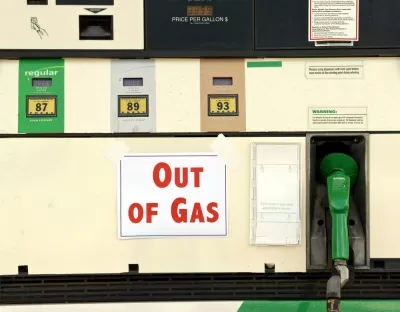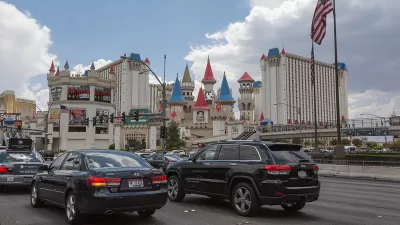Gas prices are 80 cents a gallon less than a year ago and $1.50 less than April 2014. With this amount of savings, the economy should be improving from all the extra cash in consumers' hands. You'll be surprised where much of the savings is going.

"Here's a funny one: Americans have spent their gas savings on gas," writes Myles Udland for Business Insider. According to new figures on spending released last week by the Department of Commerce's Bureau of Economic Analysis (pdf) last week, "inflation-adjusted personal consumption expenditures on gasoline rose 4.1% over the prior year, the most in at least 15 years."
What's surprising is what Udland doesn't attribute the increase to. No mention of driving more, or switching to gas-thirsty SUVs from compact cars, though I suspect both play a role, but I'm getting ahead of myself.
Udland wasn't surprised at the increase in gasoline spending as he anticipated it in a column he wrote in September. "The last time oil prices crashed and brought down the price of gas, US consumers spent more money on gas," he wrote.
According to behavioral economist Richard Thaler, "households typically have rigid 'buckets' of spending — $80 per week on food, $100 on gas, $500 for a mortgage, and so on. Humans tend to stick to their buckets," wrote Udland.
Thaler found that "(t)he shift toward higher grades of gasoline was fourteen times greater than would be expected in a world in which money is treated as fungible."
What's more, upgrading to "premium" was not found in other 'budgets' such as particular food items. "The one exception to that tendency was more splurging on upscale gasoline." [Emphasis is Udland's.]
Udland continues in the Sept. 5 column to indicate where the gas savings have gone—primarily increased savings, as opposed to retail sales other than gasoline.
Hat tip to Loren Spiekerman.
FULL STORY: Americans saved money on gas and then spent those savings on gas

Alabama: Trump Terminates Settlements for Black Communities Harmed By Raw Sewage
Trump deemed the landmark civil rights agreement “illegal DEI and environmental justice policy.”

Planetizen Federal Action Tracker
A weekly monitor of how Trump’s orders and actions are impacting planners and planning in America.

The 120 Year Old Tiny Home Villages That Sheltered San Francisco’s Earthquake Refugees
More than a century ago, San Francisco mobilized to house thousands of residents displaced by the 1906 earthquake. Could their strategy offer a model for the present?

In Both Crashes and Crime, Public Transportation is Far Safer than Driving
Contrary to popular assumptions, public transportation has far lower crash and crime rates than automobile travel. For safer communities, improve and encourage transit travel.

Report: Zoning Reforms Should Complement Nashville’s Ambitious Transit Plan
Without reform, restrictive zoning codes will limit the impact of the city’s planned transit expansion and could exclude some of the residents who depend on transit the most.

Judge Orders Release of Frozen IRA, IIJA Funding
The decision is a victory for environmental groups who charged that freezing funds for critical infrastructure and disaster response programs caused “real and irreparable harm” to communities.
Urban Design for Planners 1: Software Tools
This six-course series explores essential urban design concepts using open source software and equips planners with the tools they need to participate fully in the urban design process.
Planning for Universal Design
Learn the tools for implementing Universal Design in planning regulations.
Clanton & Associates, Inc.
Jessamine County Fiscal Court
Institute for Housing and Urban Development Studies (IHS)
City of Grandview
Harvard GSD Executive Education
Toledo-Lucas County Plan Commissions
Salt Lake City
NYU Wagner Graduate School of Public Service



























